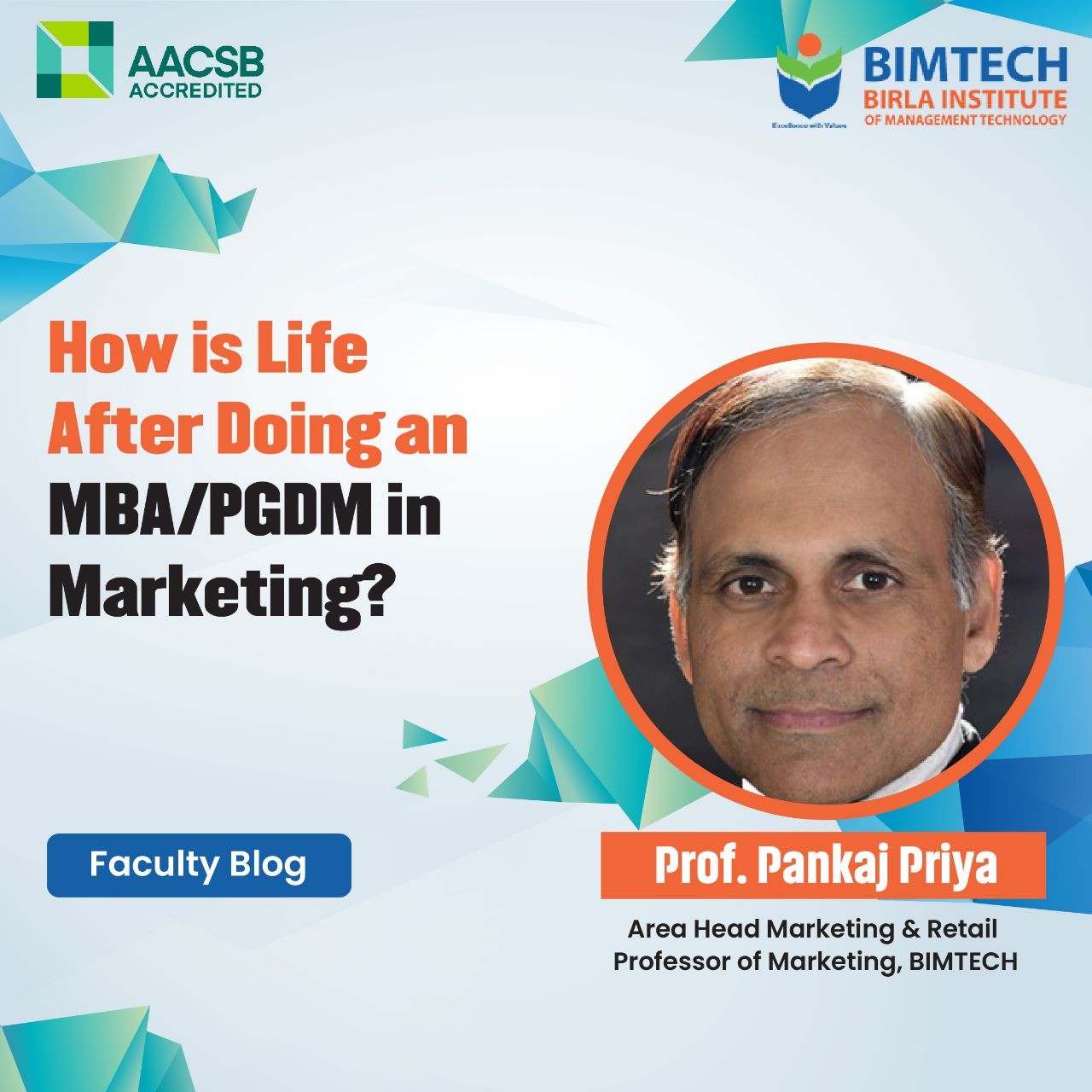
How is Life After Doing an MBA/PGDM in Marketing?

As someone with extensive experience in marketing and academia, Dr. Pankaj Priya is excited to share some valuable insights about the world that awaits you after completing an MBA or PGDM in Marketing.
Dr. Pankaj Priya has personally experienced the transformative power of this degree and can confidently say that it opens up numerous opportunities and propels your career to new heights.
What is MBA/PGDM in Marketing?
An #MBA, which stands for Master of Business Administration, and a #PGDM, which stands for Post Graduate Diploma in Management, are both postgraduate degrees in the field of business management. These programs specialize in marketing.
The primary focus of an MBA or PGDM in Marketing is to equip students with the knowledge, skills, and strategic thinking required to excel in marketing roles. The curriculum covers a wide range of subjects related to marketing, including consumer behavior, #marketresearch, #branding, #advertising, #digitalmarketing, #salesmanagement, #productmanagement, and #marketinganalytics. Success of any business depends on its ability to market various offerings to its target audience. Marketing 4.0 demands upgraded skills and knowledge to meet the challenges posed by the fast changing business scenario.
These programs aim to develop students’ understanding of market dynamics, consumer preferences, and competitive landscapes. Students learn how to design effective marketing strategies, develop impactful communication campaigns, and leverage various marketing channels to reach their target audiences. The curriculum often combines theoretical knowledge with practical applications through case studies, projects, internships, and guest lectures from industry experts.
Upon completion of an MBA or PGDM in Marketing, students are prepared for careers in diverse industries and organizations such as corporations, advertising agencies, consulting firms, retail companies, and technology startups. Graduates can pursue roles such as #marketingmanager, #brandmanager, #productmanager, #digitalmarketingspecialist, #marketresearcher, #marketingconsultant, #salesexecutive, or #businessdevelopmentmanager.
The duration of an MBA or PGDM program in marketing varies from one to two years, depending on the institution and program structure. These programs are typically offered by reputable business schools or management institutes recognized for their expertise in marketing education and research.
Life After Doing MBA/PGDM
Personal Growth and Enhanced Skills
Remember, it is the marketing professionals who move up the corporate ladder at a fast pace. Pursuing an MBA or PGDM in Marketing equips you with a wide range of skills and knowledge that go beyond the realm of marketing itself. Throughout your program, you will develop analytical thinking, strategic planning, problem-solving, and decision-making abilities, which are highly sought after in the corporate world.
By establishing a strong foundation in marketing principles, you will gain a deep understanding of #consumerbehavior, #markettrends, #brandingstrategies, and #effectivecommunication techniques. These skills will empower you to create persuasive marketing campaigns, develop impactful branding initiatives, and make informed business decisions that drive growth and profitability.
Vast Career Opportunities
The allure of an MBA/PGDM in Marketing lies in its versatility and the multitude of career paths it offers. Graduates are in high demand across various industries, including #consumergoods, #retail, #finance, #technology, #hospitality, and #consulting, among others. This degree opens doors to diverse roles such as marketing manager, brand manager, product manager, digital marketing strategist, market researcher, sales executive, and business development manager.
With the rise of technology and digital marketing, the opportunities in this field have expanded exponentially. From managing social media campaigns to optimizing search engine rankings, from data analytics to customer relationship management, the digital realm has opened up new horizons for marketers.
Lucrative Compensation and Growth
One significant advantage of pursuing an MBA or PGDM in Marketing is the potential for attractive financial rewards. Marketers generate revenue for the organization. Therefore, marketing professionals often enjoy competitive salaries, lucrative bonuses, and appealing perks. With your specialized knowledge and leadership skills, you become a valuable asset to organizations, leading to higher remuneration and rapid career growth.
In addition to monetary benefits, this degree sets the stage for continuous professional development. Lifelong learning is crucial for success in marketing, and an MBA/PGDM equips you with the skills to adapt to evolving industry trends and seize emerging opportunities.
Networking and Industry Exposure
While the knowledge gained during an MBA/PGDM program is invaluable, the connections you establish are equally significant. Your program will introduce you to a diverse group of talented individuals, including fellow students, #alumni, #faculty, and industry professionals. These networking opportunities can play a pivotal role in securing internships, job offers, collaborations, and mentorship throughout your career.
Furthermore, many MBA/PGDM programs include industry immersions, internships, and guest lectures by seasoned professionals. Such experiences provide you with real-world insights, practical exposure, and the latest marketing strategies and practices.
Entrepreneurial Ventures
An MBA/PGDM in Marketing also nurtures an entrepreneurial mindset, equipping you with the skills required to start and manage your own business. By gaining knowledge in areas such as #marketanalysis, #financialmanagement, and #strategicplanning, you develop a solid foundation to transform innovative ideas into successful ventures.
The business acumen acquired through your degree enables you to identify market gaps, develop effective marketing plans, and understand consumer preferences, allowing you to establish and grow your own business in a competitive landscape.
Continued Learning and Thought Leadership
Completing an MBA/PGDM in Marketing is just the beginning of a lifelong journey of learning and professional growth. The marketing field is ever-evolving, with new technologies, trends, and consumer behaviors constantly emerging. As a marketing professional, it is crucial to stay updated with the latest industry developments and continuously enhance your skill set.
Engaging in conferences, workshops, online courses, and industry publications will keep you at the forefront of marketing innovations and best practices. Furthermore, your MBA/PGDM degree can open doors to opportunities for thought leadership, enabling you to contribute to industry discussions, publish research papers, and become a recognized expert in your field.
Wrapping Up
Embarking on an MBA/PGDM in Marketing is a transformative journey that equips you with invaluable skills, opens doors to diverse career opportunities, and positions you for personal and professional growth. From attractive compensation and rapid career progression to the potential for entrepreneurship and thought leadership, the benefits of this degree extend far beyond the classroom.
Remember, your success after an MBA/PGDM lies not only in the degree itself but also in your determination, adaptability, and passion for the field. Embrace the challenges, seize the opportunities, and let your marketing prowess shine as you embark on this exciting adventure called life after your MBA/PGDM in Marketing.
About the Author-
Dr. Pankaj Priya is the Professor & Area Head – Marketing and Retail at BIMTECH. With extensive industry experience spanning diverse sectors and regions across India, Dr. Pankaj is passionate about imparting the knowledge he has accumulated over the years to his students. His unique contribution as a resource lies in bridging theory with real-life scenarios, bolstering students’ conceptual understanding. Dr. Pankaj’s engagement extends beyond the classroom, offering guidance during internships and early career phases. He is committed to supporting career transitions, even after years of employment.
